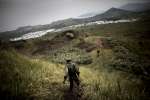- Text size
 |
|  |
|  |
| 
- Français
UNHCR warns of new risks to civilians in Central African Republic as fighting spreads
Briefing Notes, 15 March 2013
This is a summary of what was said by UNHCR spokesperson Fatoumata Lejeune-Kaba – to whom quoted text may be attributed – at the press briefing, on 15 March 2013, at the Palais des Nations in Geneva.
UNHCR is increasingly worried by the situation in south-eastern Central African Republic (CAR) where attacks this week are posing additional risks to the civilian population, including Congolese refugees.
On Monday, Seleka rebels who signed a peace accord with the government two months ago, attacked and took over the town of Bangassou. The rebels have been advancing eastwards towards the town of Zemio, where 3,300 refugees from Province Orientale in the Democratic Republic of Congo (DRC) reside.
As well as presenting a security risk, the Seleka advance is further compromising our access to refugees and internally displaced populations. UNHCR and other humanitarian agencies have been forced to temporarily relocate some staff to Bangui, the capital. Although we still have some staff in place, services for refugees are nonetheless reduced.
Clashes since December between Seleka forces and the CAR army have seriously restricted humanitarian access to some 5,300 refugees and over 175,000 internally displaced persons (IDPs).
Meanwhile an estimated 29,000 civilians have fled to neighbouring DRC. Chad has also received some 5,000 refugees since the beginning of the crisis. People continue to cross into southern Chad in the wake of the takeover of the town of Sido by Seleka forces on March 1.
Over the past two months UNHCR and other members of the protection cluster have conducted evaluation missions to nine of CAR's prefectures. Most of the internally displaced people we spoke to reported that they were living in fear and insecurity: 88 per cent of community members surveyed told us they do not feel safe. In addition, 99 per cent of the 168,000 children who went to school before the crisis are no longer in school. Even more worrying, 1 in 5 of the children out of school is believed to have been forcibly recruited by armed groups.
The Protection Cluster mission found that in most cases civilians have extremely limited access to food and basic services because of the combination of continuing armed violence, human rights violations and forced displacement. People are also subjected to physical assault, rape, and looting and extortion of their properties. Humanitarian workers are also facing harassment, including theft and looting of their office premises.
UNHCR reiterates its call to the government and rebels Seleka to ensure the protection of civilians and to facilitate access for humanitarian to people in need.
For further information on this topic, please contact:
- In CAR, Djerassem Mbaiorem, on mobile +236 72 22 35 11
- In Geneva, Fatoumata Lejeune-Kaba on mobile +41 79 249 34 83










































